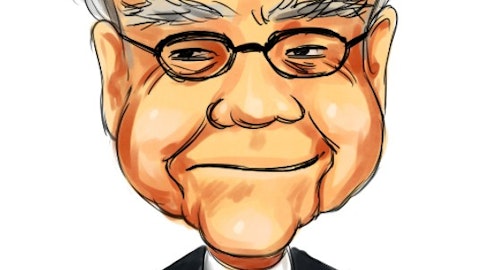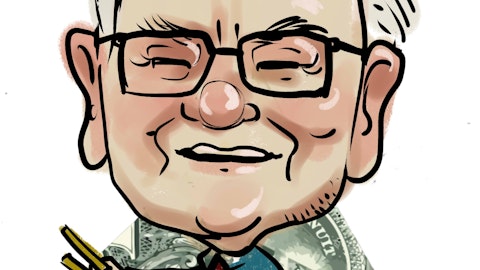Fairfax Holdings, founded by the “Warren Buffett of Canada” Prem Watsa, has been burned in the last year with its large position in Research In Motion (NASDAQ:RIMM). Prem Watsa is largely known for his value-type investing, a strategy where an investor purchases companies trading below its intrinsic values. At the end of Q1 2012, Prem Watsa was holding 17% of its portfolio in RIMM, an accumulation that began in Q3 2010. Whereas Prem Watsa sees an undervalued stock, most investors see a fallen angel who can’t get back up.
RIMM’s revenues stem largely from its Blackberry division. However, amid product delays, a highly competitive industry with Apple (NASDAQ:AAPL), Microsoft (NASDAQ:MSFT), and Google (NASDAQ:GOOG), and missed earnings (RIM posted a loss of 518 million dollars in Q1 2012), its earnings could be in jeopardy. The term “value trap” describes investing in a perceived undervalued stock (low P/E or high P/B ratios, etc.) that never improves to its intrinsic value, due to different reasons resulting in decreased future earnings. Did Prem Watsa fall into a value trap? We’ll discuss below.
Arguments for No: RIMM is undervalued and is a great play for Prem Watsa. RIMM’s stock price has fallen 95% from its 2008 all-time high and is trading below book value with a P/B of 0.38. If RIMM was forced to liquidate all its assets, it could theoretically net a gain for shareholders (assuming transactions and liquidity conditions were fair). RIMM reported a Q1 2012 loss of 518 million(!), but 326 million was from goodwill impairment. Is it likely that RIMM’s next quarter will be another loss? Yes. Is it likely that RIMM will have another significant goodwill impairment? No.
Criticism of RIMM’s North America sales masks the company’s strong international growth. RIMM has rushed into EMEA and APAC markets that have a strong demand for smartphones but cannot afford the price tag of an Apple’s IPhone or Samsung’s Galaxy (carriers subsidizing mobile phones is often specific to North America). International sales will continue contributing to the bottom line even as revenues and subscriptions fall in North America.
RIMM can continue cost-cutting and conserving money the next six months for its planned release for Blackberry 10. It’s estimating $1 billion in cost-cutting through approximately 5,000 layoffs and other restructurings. This could buy RIM enough time to release Blackberry 10 in early 2013 without having to take on any debt. In Q1 2012, RIMM had approximately 2.2 billion in cash which still could be used for R&D and other business projects. If Blackberry 10 lives up to hype, as CEO Thorsten Heins claims it will be, RIMM’s stock will easily speak for itself. RIMM has also stated that licensing Blackberry 10 could be a potential revenue driver.
RIMM’s discounted market cap also makes RIMM a potential buy-out target. Potential buyouts could be lucrative if they paid closer to RIMM’s book value ($17-$22). These suitors include companies such as Microsoft, Facebook, and Google for reasons such as RIMM’s enterprise market, expansion into mobile phones, and patent litigation/protection. Judging by recent comments, management appears to be open toward these strategic partnerships; RIMM has hired investment banks to perform their due diligence.
Arguments for Yes: RIM is a classic value trap. Prem Watsa has continued to double-down on what will likely be a losing investment. As we reported back on February 6th, the positions in RIMM have doubled shortly around the time Prem Watsa joined RIMM’s board. Being on RIMM’s Board of Directors could give Prem Watsa insight into strategic decisions of RIMM or it could be clouding his judgments. Prem Watsa has been wrong before on deals in Abitibi and CanWest, both companies which entered bankruptcy protection in 2009.
Blackberry 10 could be a flop and too little, too late to retain market share. The expected release date is after 2012’s December holiday season, which would have been helpful to build momentum and excitement about the new platform. Brand loyalty to Blackberry isn’t as strong as Apple, which could be a problem to convince former BB users to come onto the new platform. The lack of new Blackberry phones for the next six months will be during a period where the IPhone 5 is released; both Samsung and Apple will continue to compete in the high-end smartphone segment. Continued layoffs may detail an overworked RIMM that could result in poor product development.
Enterprise sales will continue to decline. At the moment, enterprise decisions will continue to be made about what platform to adopt. As Android/WP7 have made a push toward mobile security (an area where RIMM was particularly strong), we could see CIOs make a decision to adopt to different platforms than the standard Blackberry Enterprise.
A second potential writedown for Blackberry Playbooks is possible. Playbook sales in the last quarter were horrendous with 260,000 sales in the Playbook. In contrast, Apple sold approximately 11 million iPads during that time. With more competitive tablets coming in a few months such as the Google Nexus, Windows Surface and potentially a Kindle 2, in the non-Apple tablet space, profit margins will be increasingly lower.
A global recession could hurt RIMM’s sales in emerging markets. Amid issues in the Eurozone and the impacts of a recessionary environment, RIMM’s push in international markets could backfire. In 2009, Prem Watsa’s admitted that the loss in his Abitibi investment was due to miscalculating the severe impact of a recession.
In short? The negatives here outweigh the upside. Prem Watsa’s doubling down strategy details a value trap as RIMM has made a history of poor business decisions over the last few years. The continued layoffs and overworked staff could indicate another rushed product. The inability to meet product launches such as launching BB10 this year, or launch a highly promoted product (the Playbook didn’t have email) is an argument that BB10 will not live up to the hype as promised. Corporate CIO’s loss of confidence in RIMM and dependence on international growth could result in continued revenue decline. RIMM is on its last legs, and a huge bet on Blackberry 10 is now more of a gamble than a sound investment.



